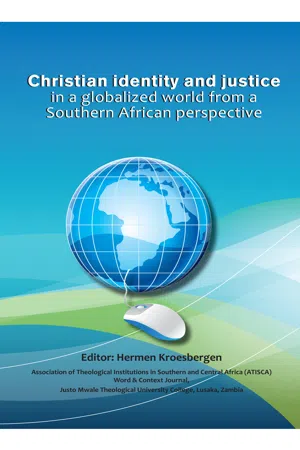
Christian identity and justice in a globalized world from a Southern African perspective
- 174 pages
- English
- ePUB (mobile friendly)
- Available on iOS & Android
Christian identity and justice in a globalized world from a Southern African perspective
About This Book
What does the globalized world that we live in mean for our Christian identity and for our struggle for social justice? That is the central question that is addressed in this book from a wide array of angles by members of the Association of Theological Institutions of Southern and Central Africa (ATISCA) and Justo Mwale Theological University College (Lusaka, Zambia)."This book is about the struggle for social justice in relation to the self-understanding of Christians from Southern and East Africa in a globalizing world. Among other concerns, it brings out the connection between theology and disability where disability is reflected as an issue that calls for self-identity and self-re-definition. This book is an important resource on contextualisation of theology and it is worthy reading" Dr. Samuel Kabue, Executive Director of the World Council of Churches network EDAN."In a work long overdue theologians and other researchers in Christianity investigate, discuss and critique the influence of globalization on Christian identity in Southern Africa and its consequences in the struggle for justice. Despite all talk about a 'global village', the voices of Christians from Southern Africa are hardly ever heard. This book represents an important change in this respect. The book has been well edited by Hermen Kroesbergen and it is a must read for all theologians and ministers who want to reflect on our shifting identifies. " Christian Literature Fund
Frequently asked questions
Information
Table of contents
- Preface
- Christian identity in a globalized world
- Speaking as a Christian without borders: A globalized identity in a localised world
- An Old Testament perspective
- Popular conceptions of Christianity in Zimbabwe as reflected in selected literary texts
- Christian identity amid African Religion: Buganu ceremony and the construction of multiple religious identities in Swaziland
- Challenges and opportunities for theological education in Zambia
- Training of ministers in a globalized world
- Christian faith and the public sphere: An analysis of Zambia as a Christian nation
- Religion and politics in a flat world: Implications for religious and political actors
- Accusations of Satanism in the public sphere
- Social justice in the global village: An imperative call to break the shackles of the past
- Christianity and social justice in Swaziland:
- Blaming the victim and not the perpetrator: An African Pentecostal interpretation of Psalms 37:25 in the light of the global North-South relations
- “Let justice flow like rivers…!” : A critique of the role of the Catholic Commission for Justice and Peace in Zimbabwe in the light of Amos 5:24
- Voice of the ‘silent creatures’: An advocacy for Christian ecological justice in an era of consumerism
- Same-sex relationships in Zimbabwe: challenges in the study of the phenomenon
- African socio-religious ethics and the empowerment of women in Zimbabwe: a critique
- Possibilities and constraints of introducing disability discourse in theological schools in Southern Africa: a case for Zambia
- Disability discourse: Imago Dei, teaching theology from a disability perspective
- List of Authors